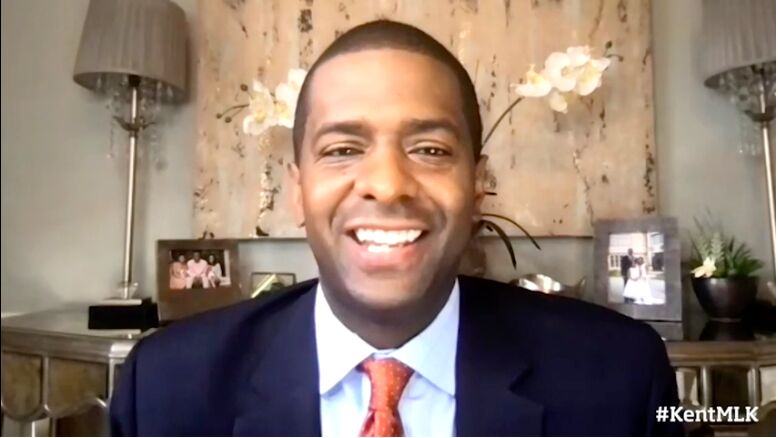Former congressman Bakari Sellers discusses racial injustice in honor of Martin Luther King Jr. Day
Former South Carolina State Representative Bakari Sellers told viewers of his virtual speech honoring the legacy of Martin Luther King Jr. that now is the most divided and divisive time in American history since the Jim Crow era or the Civil War.
“And if you think that’s hyperbole just take a look,” Sellers said. “Look at the countless men and women who took to the streets raising their voices against militarized law enforcement and for George Floyd murdered in the street by officers sworn to serve and protect him. For Breonna Taylor gunned down in her own home by officers executing a no-knock search warrant.”
Yet the issues which disproportionately affect the Black community extend past police brutality, he said. Problems such as wealth disparity and the prison population for Black men must be addressed.
He highlighted several statistics, such as the median income for Black families being about half that of white families while the unemployment rates for Black people are nearly twice as much as those for white people, and that one in three Black men are incarcerated in their lifetime.
He went on to explain how the COVID-19 pandemic intensified existing inequalities such as in access to health care. For example, Black Americans are more than twice as likely to die from coronavirus than white Americans.
“It’s frustrating and exasperating and it’s immoral and it’s un-American, but it isn’t new,” he said. “Trust me, I know. I know because I’ve heard that story my entire life.”
He told the story of his father, Cleveland Sellers, experiencing injustice firsthand when he organized a student protest in 1968. The state police fired at the students and his father was arrested for starting a riot that did not occur. He was the only person imprisoned that night.
“That night of injustice … left mothers without their sons and left the pages of my state’s history stained red with blood and left my sister [to be] born without her father,” he said.
Sellers mentioned individuals such as Rayshard Brooks, Ahmaud Arbery, Walter Scott, Sandra Bland, Atatiana Jefferson and Philando Castile among other victims of police brutality.
Yet, despite the racism of the past and the present, Sellers has faith in the future.
“So instead of opportunity mixed among the obstacles, I find sunlight peeking through the clouds,” he said. “I find hope, and it’s easy to forget that when Pandora opened her box to release the myriad of evils into the world to plague humanity, [the] one thing remained hiding in the bottom of that box was hope.”
His hope stems from the unification of people. He cited a parable which explains that the difference between heaven and hell is the willingness of people to work together instead of alone.
“It’s a unity that says that no child should go hungry,” he said. “No mother should be too poor to see the doctor. Nobody should work 40 hours a week just to live in poverty. If you see someone who was falling in the ditch, you help him up.”
It is essential to create movements, not just moments, by investing time and energy into change, he said. During the Civil Rights Movement of the 1960s, individuals began boycotting busses and businesses and invested money in their own communities.
Without the dedication of people willing to sustain that movement, Sellers believes he would not have the opportunities he has today.
“That’s how a kid from Denmark, South Carolina, the son of an agitator, became a legislator and the youngest African American-elected official in the country,” he said.
Now is the best time to create another movement to end racial injustice, he said.
“I want you to know that this is not a political struggle,” he said. “It’s a moral struggle or moral revolution. Ours is a quest of conscience. So, as long as conscience lives within our soul driving our moral hearts to beat we must continue both our struggle and our story.”
Madisyn Woodring is a reporter. Contact her at [email protected].



